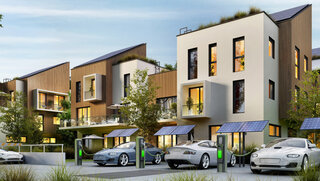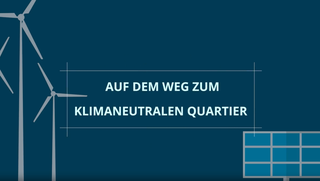Energy Efficiency in Cities/Industrial Parks
Both in Germany and China, cities, district and industrial parks set up their own climate goals based on their integrated energy plan. Measures for energy transition and increasing energy efficiency and enlarge renewable energies are always suggested, but implementation always challenges the stakeholders at local level and are also the focus of exchanges in the Sino-German cooperation. Under the framework of Sino-German Energy Partnership, we implement the Sino-German Demonstration Project on Energy Efficiency in Cities to support energy transition and decarbonization of the pilot urban area (typically form as industrial parks in China). By engaging German and Chinese companies, the demonstration project developed integrated energy plan and further supported the implementation of the selected measures in the plan.

The Challenge
Urban areas are responsible for 60% of global greenhouse gas emissions. Due to their dense population, cities are also most vulnerable to the impacts of global warming. Hence, with a share of 78% of the world’s energy consumption, the decarbonisation of urban areas plays a crucial role.
The successful urban energy transition requires joint efforts to increase energy efficiency, and to switch from fossil fuels to renewable energies. Here, integrated energy planning comes into play. The nexus of energy, mobility, the residential sector, and industry provides opportunities to leverage large energy saving potentials and increase the share of renewable energies in overall energy consumption.
Based on integrated planning at the local level, a detailed action plan is developed and selected measures are implemented to contribute to the energy transition in the real world. Bringing stakeholders together to collectively agree on an action plan greatly influences the feasibility of implementation. Meanwhile, the presence of competent professionals and effective digital tools remains pivotal from planning through execution. Given the novelty of green transition and decarbonisation in urban areas on a global scale, widespread experiences are limited. Thus, the demonstration project forges its own model through practical development.
Our Goal
The Sino-German Demonstration Project on Energy Efficiency in Cities aims to contribute to municipal climate protection by piloting and upscaling integrated energy planning in urban areas and thus identifying existing – and economically-viable – energy saving and greenhouse gas emission reduction potentials in China. Jintan Economic Development Zone (EDZ), a provincial-level industry park and district of the City of Changzhou, Jiangsu Province, was selected as a pilot area and an example for other EDZs and urban areas across China.
The implementation of the demonstration project in Jintan EDZ will include pilot buildings with German sustainable building standard DGNB (Deutsche Gesellschaft für nachhaltige Gebäude), and demonstrate solutions for energy efficiency and decarbonisation of the build environment. As such, it will also integrate solutions of both German and China private sectors into practice.
Utilising the methodology from planning to implementation, along with the integration of digitalisation tools and leveraging strong professional capabilities, the Jintan EDZ model will be disseminated to other cities and industrial parks throughout China.
The Impact
Our Activities & Results
Developing Energy Concepts to Guide Overall Planning
At the core of the project, German and Chinese experts developed an integrated energy concept for Jintan EDZ. The concept covers the energy demand and supply side, renewable energy and energy efficiency potentials, as well as mobility and transport solutions for the district. The outcome details specific measures for two pilot areas of the industry park. The report shows that Jintan EDZ could save up to 42% of CO2 emissions by 2060 compared to a reference scenario.
Furthermore, experts from dena supported local planners to develop an energy efficiency concept for buildings. the development of this concept directly contributed to energy savings on the ground.
Increasing Capacity of Local Government
The energy concept development was accompanied by a series of training workshops 2022. More than 900 people were trained online or offline during 6 different models. Renowned international and Chinese experts shared their experiences and best practices – from energy efficient buildings to the operation of sustainable energy systems. German company representatives participated in the training – as well as in the energy concept development – and could thus lay a foundation for the later involvement in the project’s implementation phase.
Connecting Business to Engage in Urban Decarbonisation
In parallel to the work on the ground in China, several workshop series with German industry experts and researchers contributed to sharing German best practices regarding decarbonisation and the energy-efficient design of urban areas in Germany. As an outcome and highlight of this workstream, the project partners published a guideline on the carbon neutral development practices of districts in June 2022.
In 2023, additional German companies with green solutions participated in implementing the pilot buildings in Jintan EDZ. Solution providers adhering to the DGNB standard lend support to guarantee a high standard, renewable energy utilisation and enhanced efficiency during the realisation process of the pilot building.
Disseminating the Concept in China
In 2023, GIZ and its partners continued to support Jintan EDZ in the implementation of concrete measures, and actively disseminate the results to other cities and districts across China.
Through the implementation of the measures proposed in the integrated energy and energy efficiency in building concepts, we estimate that by 2060, the Jintan High Tech Zone could potentially save up to 42% of CO2 emission.
Our Partners
- CECEP Eco-Product Research and Development Center
- German Energy Agency (dena)
- Jintan EDZ, Jiangsu Province
Downloads
- Climate Neutral Disctricts Outlook for Industrial Parks_CN (24 MB, PDF)
- Climate Neutral Disctricts Outlook for Industrial Parks_EN (23 MB, PDF)
- Digital Tools for the Development of Climate Neutral Districts_CN (3 MB, PDF)
- Digital Tools for the Development of Climate Neutral Districts_EN (2 MB, PDF)
- Education and Training in the Field of Climate Neutral Districts in Germany_CN (1 MB, PDF)
- Education and Training in the Field of Climate Neutral Districts in Germany_EN (1 MB, PDF)
- Integrated Energy Efficiecny Concept in Jintan_CN (21 MB, PDF)
VIDEO: Best Practices Climate Neutral Park in Germany
